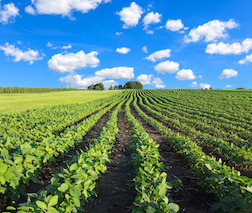 “This is an issue we have been watching for over a year,” says attorney Paul Lesko, from the St. Louis, Missouri firm of Peiffer Rosca Wolf Abdullah Carr & Kane which represents the plaintiffs. “This has been on the horizon and now it’s here.”
“This is an issue we have been watching for over a year,” says attorney Paul Lesko, from the St. Louis, Missouri firm of Peiffer Rosca Wolf Abdullah Carr & Kane which represents the plaintiffs. “This has been on the horizon and now it’s here.”The class action clearly states that the farmers don’t see this as an “anti-GMO” lawsuit – instead, they say, it’s about a bio-tech industry that has repeatedly “failed to handle the risks associated with the GMOs in responsible ways” according to the documents filed in the United States District Court for the Eastern District of Missouri Eastern Division.
The suit alleges the defendants in the class action suit, Monsanto Company, BASF Corporation, BASF Se, BASF Crop Protection, E.I. Dupont De Nemours and Company, Pioneer Hi-Bred International and Dupont Pioneer should not have sold dicamba herbicide resistant soybean and cotton seeds until the herbicide was ready for sale.
Two types of genetically modified seeds had been developed, Xtend Soybeans and XtendFlex Cotton by Monsanto. When used in combination with dicamba the result would be weed free fields with increased yields. According to the documents Monsanto promoted the seeds as “blockbusters”.
However, the herbicide meant to accompany the use of those seeds was known to “drift”. Farmers and industry analysts warned that using dicamba in that form could kill neighboring crops that either had no genetically engineered resistance or no natural resistance to the chemical.
“We allege there is a defect in the product. What happens is there a temperature inversion. The temperature gets colder on the ground than it is in the air above. That allows a vapor to form a cloud, rise up and then when the temperature slips again the vapor drops down miles away,” says Lesko. “The leaves crinkle and shrivel.”
Monsanto, BASF and Dupont had developed a new version of dicamba to deal with the drift problem but it had not received approval from the Environmental Protection Agency (EPA) and was not ready for sale. According the statements in the lawsuit dicamba, in its original form, could not be legally used in 2015.
Monsanto went ahead and released XtendFlex Cotton and Xtend Soybeans to farmers in 2015 on a limited basis.
According to the statements in the complaint Monsanto publicly told farmers not to use the old dicamba on Xtends crops. Privately, according to the complaint and statements made by farmers, sales representatives told farmers to go ahead.
The urge to increase yield among many farmers with Xtend cotton and soybean seed was too much.
“There have been complaints of damage to crops in Arkansas, Missouri, Illinois, Minnesota and pretty much anywhere were soybeans are planted the damage is showing up,” says Lesko. “It is taking longer to show up the more north you go because their growing season is a little bit behind.
“One of our clients had a peanut crop that was affected,” says Lesko. “They took the peanuts to a lab and confirmed residue of dicamba.”
READ MORE MONSANTO ROUNDUP LEGAL NEWS
Monsanto, Dupont and BASF have yet to respond to the class action.
“We are in the early stages of this. We are talking to farmers, but we are also talking to landowners too. Their trees are hurt, their rose bushes are hurt. Depending on how many people are involved will dictate where the case goes from there,” says Lesko.

READER COMMENTS
allan stanton
on
Talk about creating a "heat dome for croplands, like we have for cities" we now HAVE damaged mother earth